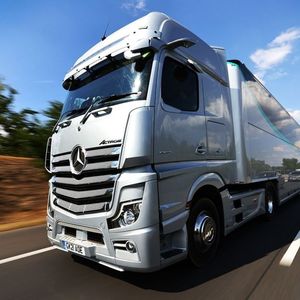Biofuels trail for European land freight reduces CO2 emissions

SOURCE: Mercedes
September 27, 2022
BY Mercedes
The Mercedes-AMG PETRONAS F1 Team recently concluded a trial in the use of biofuels in our 16 Mercedes Actros Gigaspace race trucks for the final three races of the European season. As part of our drive to further reduce our CO2 emissions and achieve verified Net Zero by 2030, the trial was designed to understand the level of carbon saving and positive impact that can be achieved using biofuels, as well as the sourcing challenges across Europe, to assist the development of our strategy to maximise the use of sustainable fuels for the 2023 European races.
The trial took place between the Belgian Grand Prix in Spa, the Dutch Grand Prix in Zandvoort and the Italian Grand Prix in Monza, a distance of approximately 1400 kms. Analysis conducted after the trial concluded has shown that the use of HVO 100 biofuel saved 44,091kg CO2 and reduced freight emissions by 89 percent.
One of the team’s trucks was initially tested and successfully powered by HVO100 biofuel from the Hungarian Grand Prix back to our headquarters in Brackley, U.K. Following this journey, 13 race trucks which spent the summer shutdown in Belgium and three trucks from the U.K., used locally sourced biofuel to travel 300km from Spa to Zandvoort and then 1100km from Zandvoort to Monza, with only the final 20km requiring the use of diesel fuel due to supply challenges.
Hydrotreated vegetable oil (HVO 100) fuel is a 100 perent renewable fossil fuel free product derived from vegetable oils, waste oils and fats. The use of HVO100 can significantly reduce CO2 emissions and reduce the impact of freight on local air quality by reducing NOx and particulate emissions.
Advertisement
Advertisement
Bioenergy currently accounts for roughly one-tenth of the world’s total primary energy supply, with biofuels demand forecasted to increase by 28 percent by 2026. Biofuels are already being used in motorsports, with Formula One introducing the use of E10 biofuels this year as part of the drive to transition to 100 percent sustainable fuel in F1 cars from 2026.
Over the past few years, we have worked tirelessly to change and better understand the impact that our activities have, and our mission has evolved as we seek to win sustainability on track and in business. This announcement follows a series of commitments to operate more sustainably, including becoming the first global sports team to invest in Sustainable Aviation Fuel, and further cements our ongoing pledge to sustainability and desire to drive change within Formula One.
Toto Wolff, team principal and CEO of the Mercedes-AMG PETRONAS F1 team, said, “Sustainability is at the heart of our operations. Trialling the use of biofuels for our land freight is another example of our commitment to embed sustainability in every decision we make and action we take. We aim to be on the cutting edge of change and hope we can make the adoption of sustainable technology possible as we are all in the race towards a sustainable tomorrow.”
Advertisement
Advertisement
Alice Ashpitel, sustainability and environmental manager at the Mercedes-AMG PETRONAS F1 Team commented: “We are committed to using our global motorsport platform to be leaders in the journey towards not just sustainable racing but a more sustainable future. The outcome of this trial with an 89% reduction in emissions is another example of our drive to become the most sustainable sports team and comes following a period of commitments from the team to invest in industry-leading sustainability strategies.”
Related Stories
NREL announced the findings of the Assessment of BQ-9000 Biodiesel Properties for 2024, the eighth in a series of annual reports documenting the quality of biodiesel from U.S. and Canadian producers participating in the BQ-9000 program.
Kintetsu World Express Inc. has entered into a new agreement with Shell Aviation regarding the use of SAF. Under this agreement, KWE will adopt Shell Aviation's digital platform "Avelia" to swiftly address shippers' low-carbon transportation needs.
Aemetis Inc. released Q2 results, reporting increase revenue when compared to Q1. During an earnings call, company officials detailed progress with the company’s RNG, ethanol, biodiesel, SAF and carbon CCS projects.
Calumet Inc. on Aug. 8 confirmed its Montana Renewables biorefinery is currently running at full capacity. An initial phase of the company’s MaxSAF initiative remains on track to boost SAF capacity to up to 150 MMgy by mid-2026.
Marathon Petroleum Corp. on Aug. 5 released second quarter financial results, reporting improved EBITDA for its renewable diesel segment. The company primarily attributed the improvement to increased utilization and higher margins.
Upcoming Events










